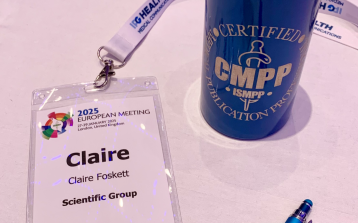Antimicrobial resistance (AMR) is one of the greatest global concerns in the 21st century owing to the rapid increase in the rate of AMR infections and the lack of new antimicrobial medications.(1) A paper published by the Lancet in 2022 estimated that the number of deaths associated with bacterial AMR in 2019 was 4.95 million (3.62–6.57), including 1.27 million deaths directly attributable to bacterial AMR.2 It has been forecast that by 2050, 10 million deaths per year will be attributable to AMR.(1) Obtaining precise figures is challenging, as deaths related to resistance must be documented by healthcare professionals, and those most affected often encounter difficulties accessing medical care and medications.(3)
What causes AMR?
AMR results when microorganisms evolve to no longer respond to medication, making infections difficult to treat and raising the risk of disease spread and severity.(4) One of the main causes of AMR is the overuse and misuse of antibiotics in clinical care.(4)
In medical practice, overprescription of antibiotics is a key contributor to AMR. The Center for Disease Control and Prevention estimates that more than 28% of antibiotic prescriptions in outpatient settings are unnecessary (based on US statistics).(5) Total inappropriate antibiotic use, inclusive of unnecessary use and inappropriate selection, dosing and duration, may approach 50% of all antibiotic use.(5) Numbers differ depending on location, and therefore it can be assumed that the statistics for inappropriate use of antimicrobials in developing regions of the world are much higher.(2)
What are some challenges to improving efforts against AMR?
A major challenge to tackling AMR is understanding the true burden of resistance. Many locations do not have the resources or knowledge required to facilitate a high level of AMR surveillance.(2) Consequently, they rely on information provided by locations equipped with the necessary means and expertise.(2) A comprehensive estimate covering all locations as well as a broad range of pathogens has yet to be published; therefore, understanding the global burden of AMR and the highest priority pathogens is particularly difficult.(2)
Although AMR is a problem in all regions, pathogen-specific prevalence is heavily dependent on location.(2) For instance, multidrug-resistant (MDR) and extensively drug-resistant (XDR) Mycobacterium tuberculosis is a severe concern for India and neighbouring countries.(6) Sub-Saharan Africa faces severe treatment challenges due to the prevalence of methicillin-resistant Staphylococcus aureus (MRSA) and has the highest mortality worldwide owing to AMR (99 deaths per 100,000 people).(7) Europe sees significant antifungal resistance with Candida species, with particular prevalence in The Netherlands and Belgium.(8) Candida albicans is the most prevalent strain that causes invasive candidiasis, which already has a mortality of 30–40% with adequate treatment for susceptible species.(8) Therefore initiatives to tackle AMR need to be location- and even center-specific to enact changes that can have a tangible impact on patients and communities.
What is antimicrobial stewardship (AMS)?
AMS refers to the optimal selection, dosing, and duration of antimicrobial treatment resulting in the best clinical outcome with minimal side effects for patients and minimal impact on subsequent resistance.(9)
AMS programs have the following goals:(10)
1. To work with healthcare practitioners to prescribe the 5 “D’s” of antimicrobial therapy, which are the right Drug, correct Dose, right Drug-route, suitable Duration, and timely De-escalation to pathogen-directed therapy
2. To prevent antimicrobial overuse, misuse, and abuse in inpatient, outpatient, and community settings, including the agriculture industry
3. To reduce antibiotic-related adverse events (e.g., infection with Clostridium difficile is more likely during and after antibiotic treatment)
4. To minimize resistance
5. To reduce healthcare-associated costs
To meet the goals listed above, AMS programs include the following core elements:(10)
- Leadership commitment
- Accountability
- Drug expertise
- Action
- Tracking
- Reporting
- Education
How can we support the fight against AMR through medical communications?
World AMR Awareness Week (18–24 November 2023) provides an important reminder for our industry regarding the impact that AMR is having, and can have, unless AMS practices are spread and improved around the world. It is crucial for us in the Medical Communications industry to be up-to-date and well informed about AMR. Resistance to antimicrobials is present everywhere, with increased prevalence in the most under-resourced communities.(2,3) Being aware of the disparities that exist around the world with appropriate use of antimicrobials enables us to have conversations with the relevant stakeholders regarding the development of global and local initiatives that support AMS practices.
AMS can be improved by promoting appropriate prescribing practices and educating patients and the medical community on the proper use of antimicrobials.(10) Having sustainable AMS protocols that are upheld by the medical community and communicated to patients is a task that the WHO and other international entities have highlighted as crucial for the reduction of deaths caused by AMR in the coming years.(11) As key players in health communications, we hold power in the shaping and sharing of information that can influence the way that patients take and dispose of their medications, the types of medications that doctors prescribe, and the guidelines that hospitals put in place to handle a global pandemic. At Scientific Group, we embrace this responsibility to provide accurate, evidence-based information to support efforts to counter AMR.
References
1. Tang KWK et al. Antimicrobial resistance (AMR). Br J Biomed Sci. 2023;80:11387.
2. Murray C et al. Global burden of bacterial antimicrobial resistance in 2019: a systematic analysis. Lancet. 2022;399(10325):629–55.
3. Access to Medicine Foundation. Lack of access to medicine is a major driver of drug resistance. How can pharma take action? Available at: Lack of access to medicine is a major driver of drug resistance. How can pharma take action? | Access to Medicine Foundation [Accessed November 2023].
4. One Health Trust. What is antimicrobial resistance? Available at: What is Antimicrobial Resistance? – One Health Trust [Accessed November 2023].
5. Centers for Disease Control and Prevention. Measuring outpatient antibiotic prescribing. Available at: Measuring Outpatient Antibiotic Prescribing (cdc.gov) [Accessed November 2023].
6. Kumar SS et al. Spoligotype diversity of Mycobacterium tuberculosis over two decades from Tiruvallur, South India. Int J Microbiol. 2020. https://doi.org/10.1155/2020/8841512
7. World Health Organization. Democratic Republic of Congo. Monitoring antimicrobial resistance trends to save lives. 2022. Available at: Monitoring antimicrobial resistance trends to save lives | WHO | Regional Office for Africa [Accessed November 2023].
8. Rodrigues CF et al. Surveillance of antifungal resistance in candidemia fails to inform antifungal stewardship in European countries. J Fungi (Basel). 2022;8(3):249.
9. Gerding DN. The search for good antimicrobial stewardship. Jt Comm J Qual Improv. 2001;27(8):403–4.
10. Shresthra J et al. Antimicrobial stewardship. Stat Pearls, 2023. Available at: Antimicrobial Stewardship – StatPearls – NCBI Bookshelf (nih.gov) [Accessed November 2023].
11. World Health Organization. WHO policy guidance on integrated antimicrobial stewardship activities. WHO Policy Guidance on Integrated Antimicrobial Stewardship Activities (openwho.org) [Accessed November 2023].





